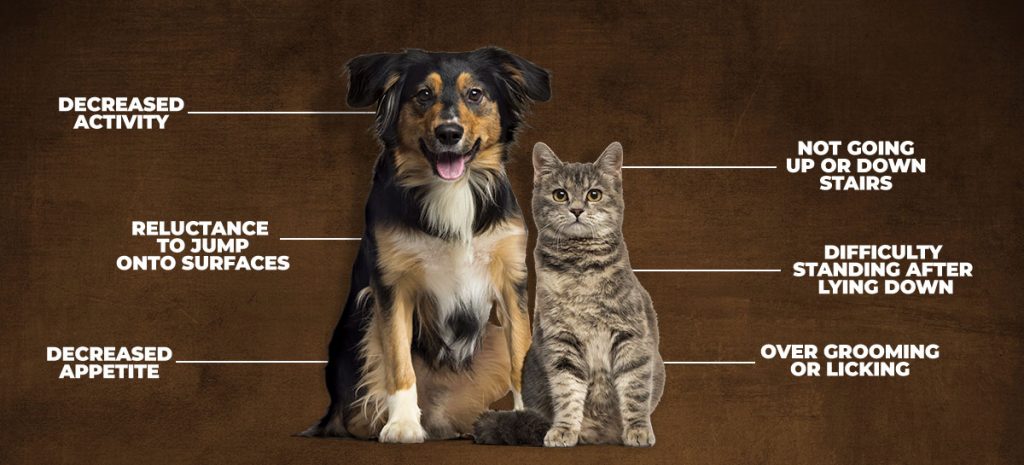We want your pet to be as
Comfortable
as possible. Knowing your pet is in pain is extremely distressing. We never want to see our furry family members in any kind of discomfort, and we’d do anything to make it go away. What’s more distressing is that our pets often can’t communicate their pain to us right away or in a clearly defined manner. If you think there’s any chance your pet may be struggling with pain, our veterinarians are extremely experienced and skilled in pain management and can offer options that can improve the wellbeing of your pet.

DIFFERENT KINDS OF PAIN
Pain management has become an important issue in veterinary medicine. Pain management will improve the recovery process, whether from illness, surgery or injury. Best of all, because it reduces stress and increases a sense of wellbeing, pain management may even help your furry friend live longer.
ACUTE PAIN
Acute pain comes on suddenly as a result of an injury, surgery, inflammation or infection. It can be extremely uncomfortable for your pet, and it may limit his or her mobility. The good news is that it’s usually temporary. It generally goes away when the condition that causes it is treated.
CHRONIC PAIN
Chronic pain is long-lasting and usually slow to develop. Some of the more common sources of chronic pain are age-related disorders, such as arthritis, but it can also result from illnesses such as cancer or bone disease. This pain may be the hardest to deal with because it can go on for years, or for an animal’s entire lifetime. Also, because it develops slowly, some animals may gradually learn to tolerate the pain and live with it. This can make chronic pain difficult to detect.

Animals instinctually hide pain. How do you know when your pet is hurting?
One common misconception that pet owners have, is that their cat or dog will cry out or whine when they are in pain. However, this is actually not as common as people believe. Our pets have quite a few other ways to deal with and show they are in pain.
CAT PAIN SIGNS AND SYMPTOMS
Chronic pain can also go unnoticed for a long period of time. Stretching anywhere from weeks to months, it can persist much longer than expected. Cats can be especially good at hiding illnesses. Owners should look out for these specific things in their felines:
- Reduced activity
- Loss of appetite
- Quiet/loss of curiosity
- Changes in urinary/defecation habits
- Hiding
- Hissing or spitting
- Lack of agility/jumping
- Excessive licking/grooming
- Stiff posture/gait
- Guarding behavior
- Stops grooming/matted fur
- Tail flicking
- Weight loss
DOG PAIN SIGNS AND SYMPTOMS
Many times dog owners feel that their pet is just “getting old” or “slowing down”. Many times, however, it can actually be chronic pain. Look for these common signs of longer-lasting pain in your dog:
- Decreased social interaction
- Anxious expression
- Submissive behavior
- Refusal to move
- Whimpering
- Howling
- Growling
- Guarding behavior
- Aggression; biting
- Decreased appetite
- Self-mutilation (chewing)
- Changes in posture
What are Woodland’s treatment choices and considerations?
We want to do anything we can to ease your pet’s pain. Luckily, there are a variety of pain medications available along with new analgesic (pain-reducing) products to help treat your pet after an injury or with chronic pain. Non-steroidal anti-inflammatory drugs (NSAIDS) are often used to treat orthopedic-related pain with fewer side effects. Aside from medication, some supplements (e.g. fish oils, glucosamine and chondroitin sulfate) can also be used, especially for chronic pain caused by osteoarthritis and degenerative joint diseases. Laser surgery is also a wonderful option. There are many treatments available for managing pet pain, so come visit Woodland Animal Hospital at any time to discuss your options.
We all want to be great pet parents, and that starts with knowing as much as we can about them. We hope that by reading about pain management you’ll further understand your pets and their behavior. If you notice any of these symptoms in your pet, it might be time for a check-up!


